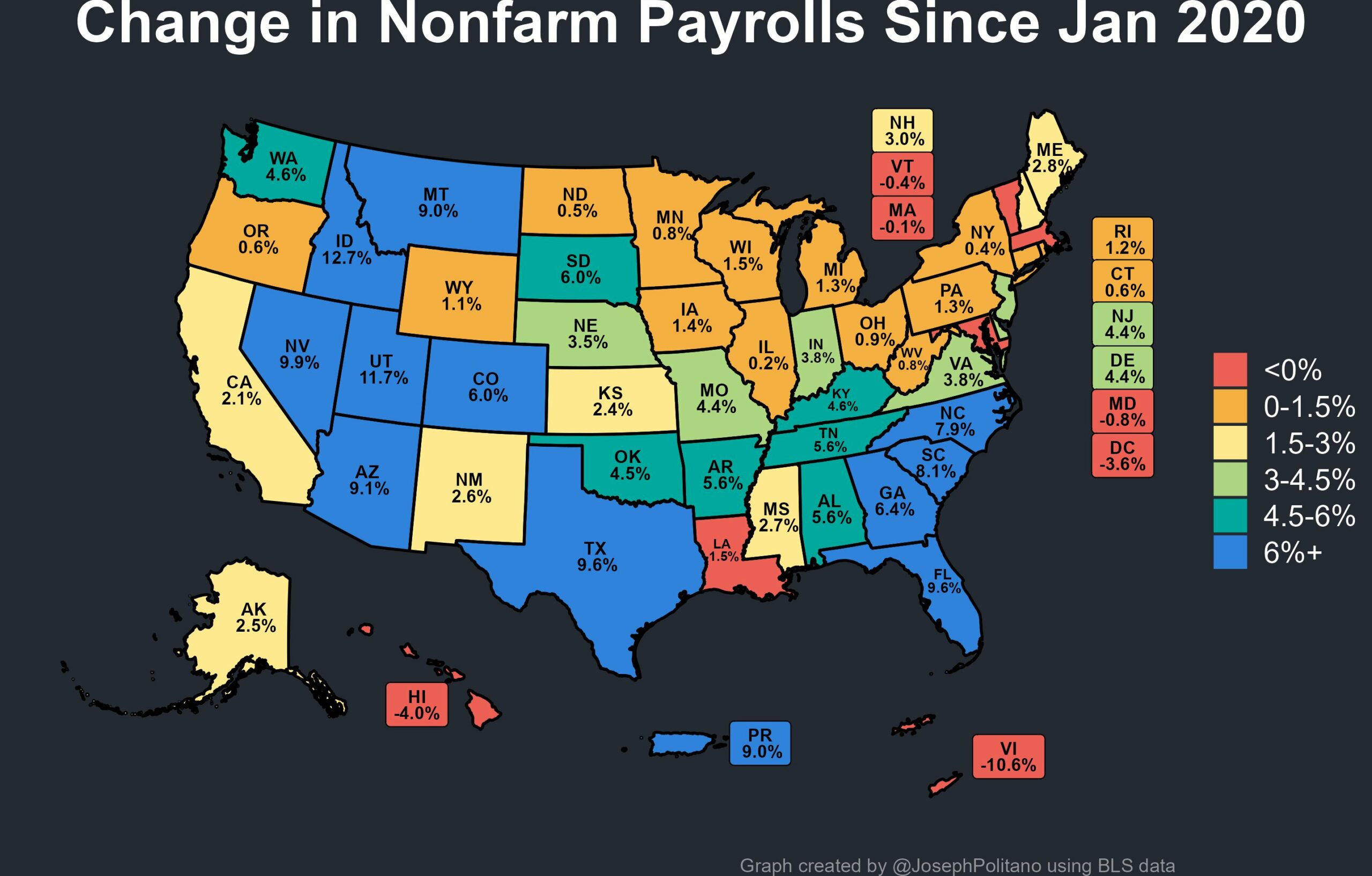A new analysis of Bureau of Labor Statistics (BLS) data finds New Hampshire’s economy is number one yet again in New England, with one of the highest job creation rates in the entire Northeast.
Joseph Politano, a Financial Management Analyst at the BLS, also writes about economics and labor markets. On Tuesday, he posted a chart showing the change in nonfarm payrolls by state since January 2020, when the COVID pandemic hit.

“Forty-five states and Puerto Rico have now seen job levels completely recover from COVID, with many vastly exceeding 2020 payrolls,” Politano wrote, noting that the fastest growers included Idaho, up 12.7 percent since January 2o2o, Utah (11.7 percent), and Nevada (9.9 percent).
Among the six New England states, New Hampshire had the biggest surge in payrolls, up three percent. While that doesn’t compare favorably with Florida (up 9.6 percent), it’s the best in the region and far better than Massachusetts and Vermont. They’re still negative on job growth by -0.1 percent and -0.4 percent, respectively.
Maine closely trails the Granite State at 2.8 percent growth, followed by Rhode Island (1.2 percent) and Connecticut (0.6 percent).
The only state in the entire Northeast Corridor with higher job growth was New Jersey, at 4.4 percent.
This is just the latest ranking to place New Hampshire at the top of the economic heap in New England. Or, in some categories, the entire nation.
In just the past few months, the Granite State has been ranked number one in the best return on investment for taxpayer dollars and the most economic freedom. U.S. News and World Report ranked New Hampshire the best state in New England to live in and the second-best in the entire country. (Utah is number one.)
And New Hampshire has consistently had among the lowest unemployment rates in the U.S., currently tied for the fourth lowest at 2.5 percent.
Why does New Hampshire consistently outpace its bigger and wealthier neighbors like Massachusetts and New York? Ross Connelly, northeast regional director with Americans for Prosperity, credits the “pro-growth policies of Gov. Chris Sununu and the legislature.”
“They are directly responsible for this success,” Connelly said. “The other New England states should take note: reducing barriers in government, whether that be regulations or taxes, helps all citizens.”
The gap between the performance of New Hampshire and Massachusetts has emerged as an issue in the race for Granite State governor.
“Because of our focus on lower taxes, fiscal responsibility and freedom, New Hampshire is the best state in New England for small businesses to thrive, grow, and create jobs,” Ayotte told NHJournal. “These new jobs numbers further prove that the New Hampshire model works — while the Massachusetts model leaves our neighbors falling behind. As Governor, I’ll keep us on the path to prosperity and stop any effort to MASS up our state with higher taxes and reckless spending.”
Democrat Joyce Craig, on the another hand, has endorsed Massachusetts Gov. Maura Healey (D) as a campaign ally.
Republican Chuck Morse is reminding voters that, as the former state Senate president, he played a key role in the tax cuts and regulatory relief that helped New Hampshire prosper over the past eight years.
“These rankings are no accident, and they are not luck either,” Morse told NHJournal. “They’re because of the conservative policies we put in place.”
“For nearly a decade, I fought on the front lines to propel New Hampshire to the top in every category,” Morse added. “And as governor, I will continue to keep our state on the right track forward.”
Asked why they think New Hampshire’s economic achievement is outpacing progressive Massachusetts, both Craig and her fellow Democratic gubernatorial candidate, Executive Councilor Cinde Warmington, declined to comment.
Michael Skelton, president and CEO of the Business & Industry Association, spreads the credit around, including to the business owners themselves.
“The job recovery numbers are a testament to Granite State employers’ commitment to their employees and the state,” said Skelton. “New Hampshire’s low and stable taxes contribute to the success of businesses as does the state’s pragmatic regulatory structure.”
New Hampshire’s population growth in recent years is the second highest in New England after Maine. Skelton said while that is good news, there are challenges to future economic expansion. BIA’s top public policy priorities include continuing to address New Hampshire’s workforce shortage, the lack of housing for workers, and the state’s high energy costs.
“BIA is committed to leading efforts to solve these challenges to build an even stronger competitive business climate and prosperous economic future for New Hampshire,” Skelton said.
At a candidate forum hosted by the National Federation of Independent Business last week, Warmington joined the two Republicans in opposing any business tax hikes. (Craig was a no-show.)
Asked about New Hampshire’s success, the NFIB’s Bruce Berke calls it a statewide effort.
“Remember that famous saying about ‘of the people, by the people, and for the people’? Well, in New Hampshire, we mean it,” Berke said. “Our public officials talk to and work with community and business leaders to find solutions to challenges. They do their best to keep spending down, therefore tax rates can be minimal allowing investment, growth and start-ups to be confident going forward.
“It’s not rocket science: communicating and working in a logical manner can produce positive results.”





